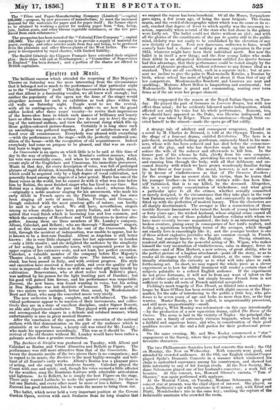A strange tale of adultery and consequent vengeance, founded on
a novel by M. Charles de Bernard, is told at the Olympic Theatre, in the shape of a four-act drama, entitled Retribution. The hero is a pale-faced, melancholy-looking gentleman, ominously bland in his man- ners, whose wife has been seduced and has died before the commence- ment of the play, and who has therefore made up his mind first to seduce the wife of the seducer and afterwards to kill him. In the former part of his scheme he fails, chiefly from his own compunc- tions; in the latter he succeeds, provoking his enemy to mortal combat, and running him through the body, with all that deliberate and un- coated ferocity with which we have grown wondrously familiar during the last three or four years. The moral, however, is not so obvious- ly • ig favour of vindictiveness as that of The Corsican Brothers ; for the avenger has no sooner slain his victim, than ho learns that his younger brother—in love with the victim's wife—has been him- self victimized, that is to say killed, by the deceased. Altogether, this is a very pretty concatenation of wickedness ; and what gives a particular spice to all the crimes, whether actually committed
or merely designed, is the circumstance that they take place in the very' Parisian society of the present day, and consequently in apartments fitted up with the perfection of modern luxury. Then the characters are all sharply discriminated. The avenger is like a resuscitation of those terrible Byronic fascinators who turned the heads of young ladies or forty years ago ; the wicked husband, whose original crime caused
the misalef, is one of those polished heartless villains with whom we have more recently. become acquainted ; the lady is an interesting heart- broken creature, pining away in consequence of her lord's neglect, and feeling a mysterious bewitching terror of the avenger, which though not exactly love is exceedingly like it; and the younger brother is one of those ardent explosive juveniles who are common enough in French drama, but scarcely known to the English stage. Strong situations, rendered still stronger by the powerful acting of Mr. Wigan, who makes himself the very incarnation of vindictiveness, calm in danger, fierce in execution—and of Miss Herbert, a new actress, of great ability, who is the perfect picture of a hapless attachment—point off the story, so as to render all its stages terribly clear and distinct, at the same time con- tinually stimulating the curiosity as to what will take place in each forthcoming act. In short, we may regard the whole piece as a clever experiment as to how far skilful treatment will render a certain class of subjects palatable to a refined English audience. If the experiment do not prove fortunate, it will not be from any want of talent on the part of either author or actors, but simply because French form is not sufficient to make all sorts of French material acceptable. Fielding's mock tragedy of Tom Thumb, as diluted into a musical bur- lesque by Kane O'Hara has been revived with slight success at the Hay- market, for the sake of introducing to the public a little boy, who pro- fesses to be seven years of age and looks no more than five, as the tiny warrior. Master Bundy, as he is called, is unquestionably precocious, and still more unquestionably—small. At Astley's, Whit Monday was solemnized—in this case intentionally —by the production of a new equestrian drama, called The Horse of the Cavern. The scene is laid in the vicinity of Naples : the principal elle- racters are a family of extremely virtuous brigands, whose best ally is a faithful and sagacious horse, and who, in consideration of their good qualities receive at the end a full pardon for their professional pecca- dilloes.
On the same evening, Mr. and Mrs. Keeley commenced a "star" engagement at the Surrey, where they are going through a series of their favourite characters.


























 Previous page
Previous page